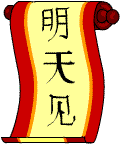Handy Mandarin Chinese Phrases
Created | Updated May 23, 2008

Mandarin is the official national standard spoken language of China, and is based on the principal dialect spoken in and around Beijing. If you're visiting the country, you may like to try out these simple phrases. Before you start it's a good idea to first look at the issues of speaking Mandarin correctly. Pronunciation and tones are important aspects of the language.
Guide to Pinyin Pronunciation
Pinyin is a system of transliterating Chinese characters into the Roman alphabet. Most of the sounds are similar to those in English with the following exceptions:
j, q, x, should be pronounced j, ch, s, respectively, with your tongue touching your bottom front teeth, and the air hissing over the middle, flat part of your tongue.
zh, ch, sh, should be pronounced j, ch, sh respectively, with your tongue curled up and back, reaching up and touching the middle of the roof of your mouth.
z, c, s, should be pronounced dz, ts, s respectively, with the tip of your tongue somewhere near the base of your front teeth.
a as in father
e as in the a in about
i as in see
o as in flow, but don't put the w on the end. Just kind of let it hang without pursing your lips
u as in oooooo
ao as in you dropped something on your foot
ei as in hey!
Guide to Tones
The other thing to bear in mind when speaking Mandarin is that it is a tonal language. Tones are not used to transmit shades of meaning, such as surprise, or a query, as they are in non-tonal languages. There are four (and a half) tones in Mandarin. How these tones are used vary extensively from province to province, making the following tone information accurate for those located in Beijing and the outlying region to the northeast, but this relates to only about 10% of the population. Across the rest of the country, tones will vary in different ways. For example, people from Shandong province usually switch their first and third tones. So bear in mind, that while the following tonal information is standard, it is not universal...
First tone (1) - a fairly high, even tone.
Second tone (2) - a rising tone, much like the question sound at the end of a sentence with a '?'
Third tone (3) - falls then rises. Much like the second, but must dip first. Some people leave the rise out altogether and just pronounce the dip
Fourth tone (4) - sharp falling. A little like how the end of a sentence with a '!' sounds. Westerners have the reputation of using this tone exclusively, for all words.
Light tone (*) - pronounce words with light tones in about half the time you would a normal word, without putting emphasis on the word.
| English | Chinese | Tones |
|---|---|---|
| Hello | Ni hao | 2 3 |
| How are you? | Ni hao ma? | 2 3* |
| Have you eaten yet? | Ni chi le mei? | 3 1* 2 |
| Good morning | Zao an | 3 1 |
| Good night | Wan an | 3 1 |
| Goodbye | Zai jian | 4 4 |
| Thanks | Xie xie | 4 4 |
| You're welcome | Bu ke qi | 4 1 2 |
| Excuse me | Dui bu qi | 4 4 2 |
| My name is... | Wo jiao... | 3 1 |
| What is your name? 1 | Nin gui xing? | 2 1 4 |
| What is your name?2 | Ni jiao shenme mingzi? | 3 1 2* 2* |
| Do you speak English? | Ni hui jiang yingyu ma? | 3 4 3 1 3* |
| I'm from the US | Wo shi mei guo ren | 3 4 2 3 2 |
| I'm from England | Wo shi ying guo ren | 3 4 1 3 2 |
| Where is/are...? | ...zai na li? | 4 3* |
| Welcome | Huan ying | 1 3 |
| Here | Zhe li | 4* |
| There | Na li | 4* |
| Who? | Shei? | 2 |
| What? | Shen me? | 2* |
| When? | Shen me shi hou? | 2* |
| Where? | Na li? | 3* |
| Why? | wei shen me? | 4 2* |
| How? | zen me...? | 2* |
| One | Yi | 1 |
| Two | Er | 4 |
| Three | San | 1 |
| Four | Si | 4 |
| Five | Wu | 3 |
| Six | Liu | 4 |
| Seven | Qi | 1 |
| Eight | Ba | 1 |
| Nine | Jiu | 3 |
| Ten | Shi | 2 |
| How much? | Duo shao | 1 3 |
| Want | Yao | 4 |
| Don't want | Bu yao | 2 4 |
| Hitchhiker's Guide to the Galaxy | Zai xing xi mian fei da cheng ta ren bian che de shou ce | 4 1 4 3 4 4 2 1 2 4 1* 2 4 |

